


UAE, 19TH FEBRUARY 2024
MUMBAI, 9TH MARCH 2024
BANGALORE, 11TH MARCH 2024

KSA, 27TH FEBRUARY 2024
SINGAPORE, MARCH 2024
MEA





UAE, 19TH FEBRUARY 2024
MUMBAI, 9TH MARCH 2024
BANGALORE, 11TH MARCH 2024

KSA, 27TH FEBRUARY 2024
SINGAPORE, MARCH 2024

We extend our heartfelt wishes for a New Year to all our readers, contributors, and partners. Reflecting on the past year, it has indeed been a fantastic journey for all of us. However, the excitement doesn’t stop there – with the dawn of 2024, we are on the brink of a thrilling adventure filled with groundbreaking developments and technological marvels that promise to reshape our future.
In this issue, we delve deep into the realms of artificial intelligence and quantum computing, two cutting-edge fields that are supposed to revolutionize the very fabric of our existence. Our contributors passionately explore the potential of AI and quantum computing, illustrating how these technological advancements are set to redefine the landscape of the coming years. The consensus among experts is that the remainder of 2024 will be dominated by the relentless march of AI, yet, as the past has shown, technology continues to surprise and amaze us with each passing hour.
As we focus on this new year, our calendar is already marked with exciting events. First in line is the eagerly awaited FITS -Future IT Summit, scheduled for February. This summit promises to be a melting pot of ideas, innovations, and insights, setting the tone for a year filled with possibilities and collaborations.
Following the FITS, our attention turns to a crucial aspect that cannot be overlooked – security. Our Security Symposium is lined up to address the pressing concerns and challenges in the digital realm. We invite all our readers to actively participate in these events, not only by consuming the knowledge shared in our magazine but also by engaging in the road shows and activities aimed at fostering the betterment of enterprises.
The upcoming months are set to be a breezy journey, with a myriad of opportunities and challenges for enterprises to navigate. We encourage our readers to stay tuned, stay informed, and actively participate in the unfolding narrative of technological evolution. The synergy between human ingenuity and technological prowess is what propels us forward, and in 2024.
Here’s to a year of innovation, collaboration, and the relentless pursuit of a future shaped by the limitless possibilities that lie within the realms of technology. Happy reading, happy exploring, and cheers to a transformative 2024!
RONAK SAMANTARAYronak@gecmediagroup.com
PUBLISHER
TUSHAR SAHOO tushar@gecmediagroup.com
CO-FOUNDER & CEO
RONAK SAMANTARAY ronak@gecmediagroup.com
GLOBAL HEAD, CONTENT AND STRATEGIC ALLIANCES ANUSHREE DIXIT anushree@gecmediagroup.com
ASSISTANT EDITORS
Rehisha Pe rehisha@gecmediagroup.com
SEHRISH TARIQ sehrish@gcemediagroup.com
GROUP SALES HEAD RICHA S richa@gecmediagroup.com
PROJECT LEAD
JENNEFER LORRAINE MENDOZA jennefer@gecmediagroup.com
SALES AND ADVERTISING
RONAK SAMANTARAY ronak@gecmediagroup.com
Phone: + 971 555 120 490
IT MANAGER
VIJAY BAKSHI
DESIGN TEAM
Creative Lead
AJAY ARYA
Senior Designer
MADAN SINGH
Graphic Designers
JITESH KUMAR
SEJAL SHUKLA
PRODUCTION, CIRCULATION, SUBSCRIPTIONS info@gecmediagroup.com
DESIGNED BY
SUBSCRIPTIONS info@gecmediagroup.com
PRINTED BY Al Ghurair Printing & Publishing LLC. Masafi Compound, Satwa, P.O.Box: 5613, Dubai, UAE
(UAE) Office No #115
First Floor , G2 Building
Dubai Production City
Dubai, United Arab Emirates
Phone : +971 4 564 8684
(USA) 31 FOXTAIL LAN, MONMOUTH JUNCTION, NJ - 08852
UNITED STATES OF AMERICA
Phone :+ 1 732 794 5918
A PUBLICATION LICENSED BY International Media Production Zone, Dubai, UAE @copyright 2013 Accent Infomedia. All rights reserved. while the publishers have made every effort to ensure the accuracyof all information in this magazine, they will not be held responsible for any errors therein.

30-35 COVER STORY
CPCA
SPARKS BRILLIANCE ACROSS KSA AND UAE


03 EDITORIAL
07-09 VIEWPOINT
11-17 CHANNEL
18-25 REAL LIFE
26-28 PRODUCTS
36-45 GUEST COLUMN
46-47 SOCIALLY SPEAKING
48 EXECUTIVE MOVEMENTS

Security teams are so busy remediating cyberattacks that they don’t have time for resources to focus efforts on strengthening defences to deflect and protect against them
 Maher Jadallah, Senior Director Middle East & North Africa, Tenable
Maher Jadallah, Senior Director Middle East & North Africa, Tenable
Tenable, the Exposure Management company, today highlighted that, of the cyberattacks Saudi Arabian organisations experienced in the last two years, 40% were successful. This forces security teams to focus time and efforts on reactively mitigating cyberattacks, rather than preventing them in the first instance. With 68% of Saudi organisations confident that their cybersecurity practices are capable of successfully reducing the organisation’s risk exposure, there is work to be done. These findings are based on a commissioned survey of 50 Saudi-based cybersecurity and IT leaders conducted in 2023 by Forrester Consulting on
behalf of Tenable.
Respondents were particularly concerned with the risks associated with cloud infrastructure, given the complexity it introduces in trying to correlate user and system identities, access and entitlement data. Half of organisations (56%) say they use multicloud and/or hybrid cloud environments. However, over half of respondents (62%) cite cloud infrastructure as one of the highest areas of risk exposure in their organisation. In order, the highest perceived risks come from the use of public cloud infrastructure (28%), multi cloud and/or hybrid cloud (20%) and private cloud infrastructure (14%).
From the study it was evident that time is not on the security team’s side. Sixty-eight percent of respondents believe their organisation would be more successful at defending against cyberattacks if it devoted more resources to preventive cybersecurity. Yet six in 10 respondents (66%) say the cybersecurity team is too busy fighting critical incidents to take a preventive approach to reducing their organisation’s exposure.
Cyber professionals cite that a reactive stance is largely due to their organisations’ struggle to obtain an accurate picture of their attack surface, including visibility into unknown assets, cloud resources, code weaknesses and user entitlement systems. The complexity of infrastructure — with its reliance on multiple cloud systems, numerous identity and privilege management tools and various web-facing assets — brings with it numerous opportunities for misconfigurations and overlooked assets. Over half of respondents (60%) said a lack of data hygiene prevents them from drawing quality data from user privilege and
access management systems, as well as from vulnerability management systems. While the majority of respondents (78%) say they consider user identity and access privileges when they prioritise vulnerabilities for patching/ remediation, 62% say their organisation lacks an effective way of integrating such data into their preventive cybersecurity and exposure management practices.
A lack of communication at the highest levels complicates and compounds the cyber problem in businesses. While attackers are continuously assessing environments, in most organisations meetings about business-critical systems take place monthly — at best. Seventytwo percent of respondents say they meet monthly with business leaders to discuss which systems are business critical, while 12% hold such meetings only once per year and 2% say they never hold such meetings.
“Far too many security teams are being overwhelmed by the sheer volume of cyberattacks they have to react to, rather than focusing efforts on reducing risks. As the attack surface becomes ever more complex, caused by trends like cloud migration and AI, this imbalance will only deepen,” said Maher Jadallah, Senior Director Middle East & North Africa, Tenable. “Firefighting is not just exhausting, but also leaves the organisation open to unacceptable risks. Security teams need to change tactic to focus instead on preventative security that deflects cyberattacks and stops threat actors gaining a toehold into the infrastructure. That will need security leadership to be involved in high-end business decision making rather than consulted after the fact. Only then will steps be taken to reduce risks and strengthen defences.”
In the dynamic realm of technology, where AI holds the promise of unprecedented advancements, a nuanced perspective surfaces among IT professionals.

Although we have seen rapid developments in artificial intelligence (AI), it seems IT professionals remain to be convinced of the value of the technology. As new research from SolarWinds highlights, less than half (44%) of IT professionals have a positive view of AI tools.
The potential risks of AI have a long history in popular media, a fact reflected by the quarter (25%) of IT professionals who say AI tools will eventually pose a threat to society itself.
However, rather than turning against AI, this attitude reflects the fact that IT professionals know that massive paradigm shifts require a great deal of planning and properly enforced controls. The survey reveals that almost
 Sascha Giese, Tech Evangelist at SolarWinds
Sascha Giese, Tech Evangelist at SolarWinds
half (48%) of IT professionals are calling for more stringent compliance and governance requirements to be put in place for AI solutions.
Despite this apparent scepticism, it’s clear that IT professionals still believe AI tools will be valuable for certain tasks. Indeed, over a quarter (28%) currently use AI tools in the workplace — while the same amount are planning imminent investment in AI. Furthermore, almost all of the tools popular among IT professionals are rushing to incorporate generative AI features into their products.
Sascha Giese, Tech Evangelist at SolarWinds, commented on the findings: “With such hype around the trend, it might seem surprising that so many IT professionals currently have a negative view of AI tools. Many IT organisations require an internal AI literacy campaign, to educate on specific uses cases, the differences between subsets of AI, and to channel the productivity benefits wrought by AI into innovation.
“The buzz around AI, particularly generative AI, is grabbing the attention of business leaders. There are clear opportunities to reduce costs, create new product lines, or enrich existing offerings. While this enthusiasm from the C-suite is great for increasing IT budgets, its understandable certain reservations persist among IT professionals — particularly when it comes to AI replacing their key daily tasks.
“Properly regulated AI deployments will benefit employees, customers, and the broader workforce. But it needs buy-in from the right people. Transparency over AI concerns and a collaborative, open discussion between business leaders and IT teams is key. Until then, we will continue to see a cautious, “wait and see” approach from IT teams slowing the adoption of these revolutionary tools. Only after the early adopters have vetted AI tools for both business value and risks will IT professionals quell the fear that the machines are taking over.”
Ability to monitor suspicious traffic not only strengthens threat detection but also informs comprehensive security posture management, laying the groundwork for a robust Zero Trust strategy.

less than half (48 percent) of organisations have insight into data moving laterally across their networks.
At the same time, security leaders have turned to encryption to hide information from prying eyes. Today, encryption makes up over 90 percent of all internet traffic, and the proportion of encrypted traffic within internal enterprise networks is growing fast. While encryption is a proven way to protect sensitive information, it also contributes to poor network visibility without robust decryption and analysis.
Cybercriminals are becoming increasingly adept at using our security methods against us, and encrypted traffic is a powerful tool in their playbook. The same confidentiality that protects data also hides malware, suspicious activity, and data exfiltration from our security teams. This doesn’t mean encryption is failing, but data centre security needs to step up to the challenge of decrypting traffic for better threat detection and response.
It is no secret that data centres are processing an immense amount of traffic. As business data grows and organisations move into increasingly hybrid cloud environments, monitoring all of this traffic for security risks becomes a real challenge. Malicious actors often hide in networks to exfiltrate sensitive data and maximise their impact, meaning data centre operators now need to have oversight over all East-West traffic for effective threat detection. Despite network visibility being a known security priority, Gigamon research found that
It might sound like a cliché, but the first step towards preventing encrypted threats is to acknowledge the risk they pose. It is impossible to defend against a threat you cannot see and can’t measure within your own data centres.
Encryption is playing a larger role in attacks, and with great success. Over 90 percent of malware attacks now use encryption to evade detection, and yet a Gigamon survey found that only 30 percent of IT and security professionals have visibility into encrypted traffic. Businesses already understand the danger of security blind spots - over half of respondents in the same survey named it their top concern – but until
now the practical challenges have been holding security teams back. The result is that these accepted un-analysed threats are contributing to a threat landscape in which almost 1 in 3 successful breaches go undetected.
In recent years, a rise in microservices and the increasing adoption of containerised applications have exacerbated this trend by increasing internal traffic. Machine-to-machine or server-to-server traffic is the perfect means for an attack to proliferate, attack, and spread. Not letting lateral movement go unmonitored has become much more important in the last few years.
Unfortunately, traditional decryption is just not a viable solution for many data centre operators. Decryption efforts usually take place at the perimeter, decrypted at the firewall, in an appliance, or using a load balancer. These methods require a lot of configuration, key management, and vast amounts of compute power to break encryption, inspect the contents, and then re-encrypt. When most traffic is encrypted, it adds up.
There are a few tricks to save resources in the decryption process. Businesses investing in decryption can take steps to minimise redundant traffic inspection and identify which network packets should be prioritised. Tactics such as application filtering, in which traffic signature is used to distinguish between high- and low- risk applications, enable teams to apply risk-based decryption across their data centres. However, it’s important to remember that these assessments are not foolproof.
Mark Jow Technical Evangelist EMEA, GigamonMindware announced the signing of a strategic partnership agreement with Xebia, a renowned global IT consultancy and software development company, to accelerate digital transformation initiatives for enterprises across the Middle East and Africa region. This dynamic partnership marries Mindware’s unparalleled distribution prowess with Xebia’s trailblazing expertise in cloud services, AI, and managed services. This collaboration is set to redefine the digital transformation landscape, offering a synergy of Xebia’s technological finesse with Mindware’s expansive market footprint to orchestrate comprehensive digital solutions.
Shedding light on the partnership, Philippe Jarre, President, Mindware Group says: “Spurred by a visionary impulse to reshape the digital domain in the MEA region, this partnership stems from a mutual recognition of the increasing need for holistic cloud, AI, and managed services solutions. Mindware’s expansive distribution network and deeprooted market acumen form a perfect complement to Xebia’s innovative technical expertise, crafting a symbiotic alliance that
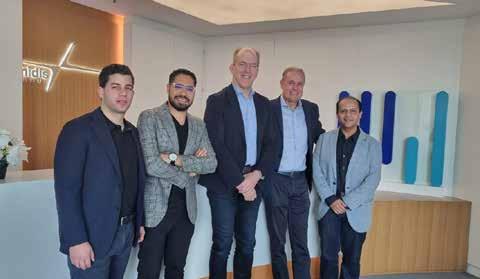
elevates both entities.”
“Through this strategic alliance with Mindware, Xebia is actively broadening our global presence and empowering our clients to propel their digital transformation journeys,” says Anand Sahey, Global CEO of Xebia. “We are confident that the synergy between Xebia and Mindware will significantly enhance the
success of businesses navigating the evolving technology market.”
Shahid Gaglani, VP Cloud at Xebia MEA, adds: “Xebia’s proposition in the MEA region is to present an integrated suite of services that includes cutting-edge cloud solutions, transformative AI technologies, and comprehensive managed services.
Barracuda Networks, announced the launch of its new global partner program, the Barracuda Partner Success Program. The new program is architected with partner success as the north star, and it is built on two foundational elements: the shared success model and partner agility. A key differentiated element of the program is its support for resell partners across multiple routes to market — resale, MSP, and marketplaces. Partners who resell Barracuda solutions will be recognized for their Barracuda business as a whole, regardless of the route to market, and they will be provided with benefits and resources based on their total sales contribution.
“In developing our global partner program, Barracuda put itself in our partners’ shoes

Jason Beal, Vice President, Worldwide Partner Ecosystems, Barracuda
to better understand their needs and build a winning go-to-market strategy. This is what we call partner empathy,” said Jason Beal, Vice
President, Worldwide Partner Ecosystems, Barracuda. “Ultimately, we want our partners to be agile in catering to the ever-changing needs of customers in terms of how they consume, procure, and deliver technology solutions.”
Shared success model and partner agility
Designed to reduce complexity and incentivize partners for their commitment to Barracuda, the Barracuda Partner Success Program includes benefits, requirements, and rewards architected around the LAER model of customer success: land, adoption, expansion, and retention and renewal. In this way, the new global partner program supports partners of different business models to grow their business and expand their customer reach while helping protect clients from cybersecurity threats.
Canon Middle East and Turkey has set its sights on robust growth, projecting 11% revenue growth in 2023. Driven by its commitment to serve the ‘Customer of Tomorrow’, the company anticipates double-digit growth in both consumer and business product segments in 2024.
Canon continues to invest more than 8% of its global sales in R&D annually, underscoring its commitment to innovation. The company’s growth mirrors global economic trends, with thriving markets such as the Middle East showcasing a robust 4.8% growth rate, surpassing the global average.
These figures and projections were revealed during Canon’s 17th regional Annual Partner Conference. Centred around the theme ‘ONE’, the recent event emphasized the importance of collaboration and innovation in the ever-evolving world of customer-centricity.

It also served as a platform to address the shifting industry landscape and respond to evolving customer needs across Middle East and Turkey.
Reaffirming the ‘New Customers, New World’ vision, the conference stressed on the approach of ‘Rethink, Revive, Reach’ that is propelling Canon forward. This approach is rooted in the understanding that in a rapidly changing landscape, Canon and its partners must constantly adapt, evolve, and refresh their strategies to meet the needs of emerging customer segments.
With a strategic focus on nurturing new skills essential to meet the needs of tomorrow’s customer, Canon supports the development of youth and future-ready employees through nurturing interns and empowering women in the workforce. solutions, transformative AI technologies, and comprehensive managed services.
Dataiku, the platform for Everyday AI, has announced that Databricks is the latest addition to its LLM Mesh Partner Programme. Through this integration and partnership, the two companies are paving a clearer and more vibrant path for Generative AI-driven business transformations while allowing the enterprise to capitalize on the immense potential of LLMs.
LLMs offer ground-breaking capabilities but create challenges related to cost control, security, privacy, and trust. The LLM Mesh is the solution — a common backbone for securely building and scaling Generative AI applications in the enterprise context. It simplifies the complexities of integration, boosts collaboration, and optimizes resources at a time when over 60% of senior AI professionals are setting their sights on Generative AI, including LLMs, in the coming year.
Together, Dataiku and Databricks
democratize access to data, analytics, machine learning, and AI, enabling a collaborative, visual experience that scales programs and accelerates the delivery of Generative AI projects.
“Databricks recognizes the immense opportunities and challenges organizations face with the intricacies of Generative AI applications and the strain it can place on both technology and talent resources. We’re excited to partner with Dataiku and look forward to enabling every enterprise to build, scale, and realize the benefits of Generative AI,” said Roger Murff, VP of Technology Partners at Databricks.
Emphasizing the unique features of the LLM Mesh, the partnership aims to provide:
• Simplified Adoption: Businesses can effortlessly delve into Generative AI, benefiting from the user-centric Dataiku platform and Databricks’ advanced Lakehouse infrastructure.
 Venkatasubramanian (Subbu), Managing Director, Canon, Middle East
Venkatasubramanian (Subbu), Managing Director, Canon, Middle East
Registration is now open for Emerson Exchange Europe, Middle East and Africa 2024, which will take place at the Congress Center Düsseldorf in Germany, from February 27-29, 2024. This will be the first Emerson Exchange in Europe to be held in-person since 2018, following the COVID-19 pandemic. With a theme of ‘Explore, Engage, Evolve’, the Emerson users’ event will highlight how industrial manufacturers exploring greenfield project developments or modernization of existing sites can employ powerful software and advanced automation solutions to achieve step-change improvements in sustainability and operational performance.
Emerson Exchange is an industryleading technical conference, where professionals from process, hybrid and discrete manufacturing gather to share ideas, collaborate on solutions and get expert advice on how to extract the most from their automation technology investments. Thousands of delegates from more than 50 countries are expected to attend the conference, where they can network with their

peers and hear more than 150 users sharing their experiences and presenting solutions to some of their most challenging automation projects. A highlight of the conference will be a summit focusing on the key topic of sustainability, where executives from leading global manufacturers will hold roundtable discussions about meeting decarbonization
targets. Emerson’s Women’s Impact Network employee resource group will host a summit focusing on the significant impact of women in business and providing valuable insights from inspirational women at the forefront of the engineering and tech industry. solutions, transformative AI technologies, and comprehensive managed services.
Sanad, the global aerospace engineering and leasing solutions leader wholly owned by Abu Dhabi’s sovereign investor Mubadala Investment Company PJSC, has entered into a landmark strategic framework agreement with Thales, a global leader in advanced technologies within Aerospace, Defense & Security and Digital Identity & Security. The agreement expands Sanad’s Maintenance Repair and Overhaul services into the dynamic fields of airport security and air traffic control and digital operation, beckoning a pivotal moment in the region’s aviation landscape.
The milestone agreement was signed during the Dubai Air Show with Mansoor Janahi, Managing Director and Group CEO of Sanad and Elias Merrawe, Vice president, Civil

Business of Thales in the Middle East, marking a significant milestone in the region’s aerospace sector. This alliance harnesses the unique
capabilities and expertise of both Sanad and Thales to propel the maintenance and delivery of essential airport systems, ensuring the safe and effective operation of major travel hubs in the Middle East and Africa.
Building on the foundation of a Memorandum of Understanding signed by Sanad and Thales in 2022, the two companies are poised to deepen their collaboration in the rapidly developing realms of airport services. Under the new agreement, the partnership will extend into the domain of airport security and digital operations, encompassing crucial areas such as airport safety and security systems in this endeavor, Thales will take the lead in designing and constructing these vital systems.
DP World’s Jebel Ali Free Zone and Transworld Group announced the signing of an agreement for the construction of a 50,000+ square metre, dry and temperature-controlled distribution centre in Jafza. The facility, which will be developed by Jafza, represents a significant expansion for Transworld that will nearly double its capacity in the region while expanding the logistics infrastructure in the Free Zone.
Abdullah Bin Damithan, CEO and Managing Director of DP World GCC, said: “We are delighted to continue our longstanding relationship with Transworld Group by partnering on this project. This agreement reflects our commitment to providing state-ofthe-art solutions that cater to the diverse needs of our clients and foster business growth in Jafza, while solidifying our position as a leader in the logistics sector.”
The warehouse construction is scheduled to begin in early 2024 and is expected to be completed by 2025, with the expansion coming on the heels of Transworld Group opening its new Cold Chain Distribution Centre in Jafza earlier this year.

PROVEN Solution focused on innovative technological solutions in AI, robotics, and AR VR, has announced its plans to strengthen their Augmented Reality offerings, demonstrating ongoing advancements and technological breakthroughs. PROVEN Solution has been strategically observing the expanding capabilities of AR, recognizing its potential to revolutionize products and customer projects. Over the past year, the company has intensively evaluated AR’s escalating potential, particularly propelled by recent hardware advancements, making it increasingly market adaptable.
“AR represents an unprecedented opportunity for us and our strategy involves a dual approach,” says Pavel Makarevich, VP of PROVEN Solution. “We are committed to developing our proprietary AR products
while tailoring customized applications for our clientele. We envision a landscape where a fusion of virtual and physical elements not only enhances knowledge acquisition but also provides a hands-on, interactive experience across diverse sectors such as education, healthcare, and training.”
AR stands poised to elevate applications to new heights by combining virtual and physical components, which has piqued the interest among companies concerning the GCC market’s readiness for AR integration. This aims for scenario-based learning and real-time practical exposure, fostering interactive engagements through AR technology. However, the current phase is characterized by exploration and experimentation, as businesses discern optimal use cases aligned with their operations.

Canon Middle East inaugurated its largest customer experience centre in Riyadh catering to the business community, offering an elevated customer experience. Since establishing its largest direct operations in the Kingdom of Saudi Arabia in 2018, Canon has remained steadfast in its commitment to driving innovation and contributing to the digital transformation outlined in the Kingdom’s Vision 2030 strategy. This continuous development underscores Canon’s unwavering dedication to the plans set forth in 2018, solidifying its position as a trusted partner in the country’s evolving technological landscape.
With a dedicated team on the ground, the Company’s direct presence has not only facilitated a deep understanding of the local market but has also enabled Canon to establish close partnerships with businesses seeking advanced digital and technology-based imaging services.
During the inauguration, Venkatasubramanian (Subbu) Hariharan, Managing Director of Canon Middle East

and Turkey, stated, “Canon aims to add value to the Saudi economy by contributing to the development of a well-defined digital infrastructure mandated by Vision 2030 and enhance the competitiveness of the Saudi economy. As a company, we are committed to aligning with the ambitious goals of the
Kingdom of Saudi Arabia. The dedication to innovation, sustainability, and economic diversification has motivated us to invest in the Saudi economy and create opportunities for the local workforce. Furthermore, our contribution to Saudization will support building a skilled and empowered Saudi workforce.”
In a series of three education-themed events arranged against the backdrop of COP28, global technology company SAP’s University Alliances has welcomed two new UAE members to its ranks, and has been collaborating with them and other parties to create awareness of the importance of young voices, education and technology to address the world’s climate challenges.
The two newest MENA institutions to join the global SAP University Alliances programme are the University of Dubai, which officially became a member while hosting the 7th international Conference on Advances in Business, and Abu Dhabi University, which signed the membership charter while co-hosting the SAP Academic Community Conference MENA at its Dubai campus.
Dr. Eesa Mohammed Al Bastaki, President of UD, said of the new membership, “At

the University of Dubai, we are committed to developing and educating leaders who will make a real difference in the business world. Through our membership of SAP University Alliances, we will be able to expose our graduates to the latest thinking and technology solutions for ESG measurement
and evaluation, equipping them to make meaningful improvements to the way the world does business. As part of our focus on purposeful education, we aim to create opportunities for students to participate in high-impact collaborations with like-minded students and SAP’s ecosystem partners.”
Oracle launched Mostaqbali, an initiative to provide technical training to Saudi youth to equip them for the most in-demand technology-powered jobs of the future. Introduced and deployed in collaboration with Future Work and supervised by Saudi Arabia’s Ministry of Human Resources and Social Development, the new program will train and certify 50,000 Saudi nationals in the latest cloud-powered digital technologies, including Artificial Intelligence, Machine Learning, and the Internet of Things (IoT) by 2027.
Mostaqbali will be available to all Saudi nationals at different stages of their learning and professional careers—from students just entering the workforce to young working professionals—with a special focus on youth and women. The program will strengthen Saudi Arabia’s IT talent pool as organizations in the country look to increasingly hire local talent to deploy new technologies and drive

digital innovation and growth in line with Saudi Vision 2030.
The Undersecretary of Ministry of HR and Social Development for Saudization, Majid Al-Dahwi said: “This initiative, which enables modern work processes such as freelancing, is a proactive step towards Saudizing the skills of the future. The goal is to enable young Saudis
with next-generation skills and talents to close the skills gap, ultimately establishing a highly skilled and creative labor market to realize the Kingdom’s 2030 Vision. This move will also strengthen government and private sector initiatives to accelerate digital transformation by using national talent pools’ skills and insights.”
IBM announced the latest investments in its effort to advance environmental sustainability through its social impact programs. A new set of environmental initiatives, including a partnership with the University of Sharjah, are pioneering water solutions that will be scaled through the IBM Sustainability Accelerator to benefit local communities across the United Arab Emirates. Simultaneously, a first-of-itskind roadmap of sustainability skills courses, available for free through IBM SkillsBuild, will empower future climate action.
The University of Sharjah will build a model and application to monitor and forecast water access conditions in the Middle East and North Africa, to help support communities in arid and semi-arid regions with limited renewable internal freshwater resources.
New IBM Sustainability Accelerator partners and projects:
IBM is furthering its commitment to sustainable innovation with projects focused on water management solutions as part of

its global social impact program, the IBM Sustainability Accelerator. The 2023 IPCC AR6 Synthesis Report identified that 3.3 billion people live in areas vulnerable to significant impacts from climate change.
• Introductory courses will help establish a foundation with historical insights and fundamentals to connect sustainability
and technology.
• Mid-level offerings in design thinking and green entrepreneurship will encourage learners to grow their skills.
• Advanced coursework will ask learners to apply their skills to sustainability topics across AI, cybersecurity, and ESG reporting.
Registration is now open for Emerson Exchange Europe, Middle East and Africa 2024, which will take place at the Congress Center Düsseldorf in Germany, from February 27-29, 2024. This will be the first Emerson Exchange in Europe to be held in-person since 2018, following the COVID-19 pandemic. With a theme of ‘Explore, Engage, Evolve’, the Emerson users’ event will highlight how industrial manufacturers exploring greenfield project developments or modernization of existing sites can employ powerful software and advanced automation solutions to achieve step-change improvements in sustainability and operational performance.
Emerson Exchange is an industry-leading technical conference, where professionals from process, hybrid and discrete manufacturing gather to share ideas, collaborate on solutions and get expert advice on how to extract the most from their automation technology investments. Thousands of delegates from more than 50 countries are expected to attend the conference, where they can network with their peers and hear more than 150 users sharing their experiences and presenting solutions to

some of their most challenging automation projects. A highlight of the conference will be a summit focusing on the key topic of sustainability, where executives from leading global manufacturers will hold roundtable discussions about meeting decarbonization targets. Emerson’s Women’s Impact Network
employee resource group will host a summit focusing on the significant impact of women in business and providing valuable insights from inspirational women at the forefront of the engineering and tech industry. solutions, transformative AI technologies, and comprehensive managed services.
Veeam Software, the #1 leader by market share in Data Protection and Ransomware Recovery, announced it has expanded its relationship with Microsoft. Veeam is making it easier for customers to protect Microsoft 365 with Cirrus by Veeam which brings the ease and flexibility of Backup-as-a-Service for Microsoft 365. Utilizing the power and reliability of the industry leading Veeam Backup for Microsoft 365 and our track record and experience with close to 18 million Microsoft 365 users under protection, these new BaaS capabilities, will include support for Microsoft 365 Backup Storage to give Microsoft customers the industry’s most popular data protection and ransomware recovery capabilities.
“Businesses today need the confidence that their critical business data is protected,”

said Danny Allan, CTO at Veeam. “We’re delighted to extend the advanced capabilities we use to protect close to 18 million Microsoft 365 users by integrating with Microsoft 365 Backup Storage. The recent addition of our BaaS offering for Microsoft 365 underlines our commitment to continuing to deliver new features and capabilities that take advantage of the power and reliability of the Veeam Data Platform which keeps businesses running.”
Veeam recently previewed this new integration with Microsoft 365 Backup Storage at Microsoft Ignite. The live demo highlighted the potential to quickly and efficiently restore large amounts of Microsoft 365 data, enabling organizations to minimize downtime following a ransomware attack or other data loss threat.
(L-R) Mike Weston, CEO at GBM and Mohammed Khalifa, CEO - Digital Industries for Middle East at SiemensExtreme Networks (released a new report titled “The World is Connected: The Store Must Be Too,” which found that retailers are most challenged by creating innovative in-store experiences that meet consumer expectations, the increasing demands on network bandwidth and emerging cybersecurity threats. However, despite 75% of respondents saying demands on network bandwidth were a major concern, the study found that the most successful retailers have leaned into Wi-Fi solutions to improve both in-store experiences and overall store operations. The survey polled 114 executives of global retail operations ranging from $100M to $5B+ in annual revenue.
Technology Adoption Can Be a Challenge: Though retailers understand the need for technology to remain competitive, deploying and managing new technology is a challenge.

94% of retailers said there is endless demand for bandwidth on their constrained networks, creating technology adoption challenges; 75% list this as their top challenge.
88% of retailers say that adding and managing new devices on the network is one of their biggest challenges. 72% of retailers say they would prefer a single network that can handle any/all future devices and deployments, yet only 17% say they strive for a consistent technology profile across all their stores. Retailers with Above Average YoY Sales Growth are Investing Strategically: Retail Winners are defined by above average YoY sales growth (industry average comparable store/channel sales growth of 7%). When compared to retail respondents with average or lagging sales, it’s clear that Winners think about technology differently.

Ericsson has partnered with du, from Emirates Integrated Telecommunication Company, to support the communications service provider to enhance the sustainability of its networks and accelerate their transition to Net Zero by reducing network energy consumption
and carbon emissions. As part of this collaboration, du’s 5G network has realized up to 50 percent less energy consumption which will reduce carbon emissions after deploying Ericsson’s 5G Massive MIMO radios along with remote radios, including tri sector
solutions such as the dual-band radio and triple-band radio. The two companies have also finished testing advanced functionalities and automation, as natively active 5G energyefficiency features like Micro Sleep Tx, can further reduce the radio energy consumption by up to 15 percent.
du and Ericsson are also collaborating to build a roadmap and deploy the latest technology capabilities of 5G and beyond to provide the UAE with the best customer experience and lowest carbon footprint for a greener future. The partnership supports the UAE Net Zero by 2050 Strategic Initiative as well du’s commitment to achieving Net Zero Scope 1 and 2 emissions within its operations in the UAE by 2030 and Scope 3 by 2050. Nicolas Blixell, Vice President and Head of Ericsson Gulf Council Countries at Ericsson Middle East and Africa, says: “It has become more critical than ever for companies across all sectors to sharpen their focus on sustainability as world leaders and stakeholders gather for the 28th UN Climate Change Conference (COP28) in the UAE.
Norman-Rice, Chief-OperatingOfficer,-Extreme-Networks Nicolas Blixell, Vice President and Head of Ericsson Gulf Council Countries at Ericsson Middle East and Africa and Saleem Alblooshi, Chief Technology Officer at du.Nutanix released the Nutanix State of Enterprise AI Report, a global research study providing insights into enterprise decision-making around AI. The report provides a holistic view into how enterprises are approaching AI technology strategy and adoption, as well as how future plans will affect IT spending and budgeting.
“In just one year, Generative Artificial Intelligence (genAI) has completely upended the worldview of how technology will influence our lives and Enterprises are racing to understand how it can benefit their businesses,” said Sammy Zoghlami, SVP EMEA at Nutanix. “While most organisations are in the early stages of evaluating the opportunity, the State of Enterprise AI report confirms that most consider it a priority. More importantly, the survey uncovered an important theme among enterprises adopting AI solutions: a growing requirement for data governance and data mobility across data centre, cloud, and edge infrastructure environments making it even more important for organisations to adopt a platform to
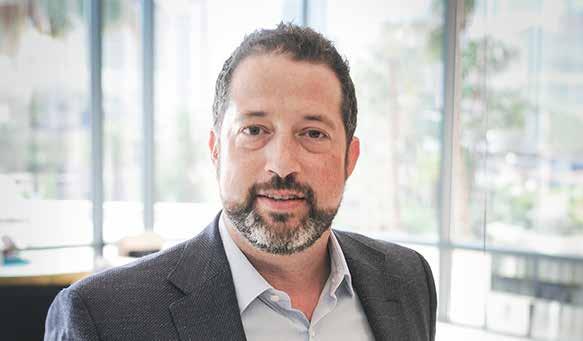
run all apps and data across clouds.” EMEA organisations plan to embrace AI solutions but are slowed by a generative AI skills-gap. 90% of EMEA respondents said that AI is a priority to their organisation. Today, the top two AI solutions deployed by EMEA organisations include virtual assistants/
customer support bots, as well as a mix of generative AI solutions. However, when it comes to AI solution implementation, EMEA respondents indicate they lack generative AI and prompt engineering skills, and they also require more data scientists and data science skills to support their initiatives.
Inadequate cloud security is leaving UAE, Saudi organisations open to data breaches says Illumio
Illumio Cloud Security Index 2023: How UAE and Saudia Arabia stack up
Inadequate cloud security practices are leaving organisations in the UAE and KSA susceptible to data breaches, according to new research from Illumio. The Illumio Cloud Security Index found that 54 percent of breaches in the UAE and KSA now originate in the cloud, costing organisations $2.3m USD annually*. This is particularly concerning given that:
• Over three quarters (76%) of respondents are running high-value applications in the cloud.
• 100% of respondents admit to storing sensitive data in the cloud.
• 98% say a cloud breach would impact their operations, with nearly half (46%) admitting a cloud breach would make maintaining normal
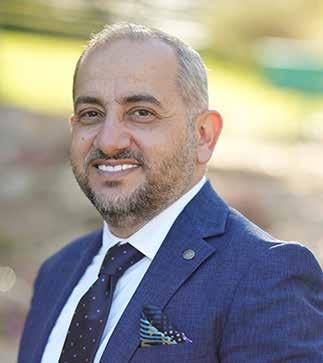
operations impossible.
• 70% of respondents believe that cloud security in their own company is inadequate and represents a major risk (higher than the global average (63%)Fears about inadequate security practices are likely down to an inability to see and respond to risks in the cloud; 97 percent say they need better visibility of connectivity with third-party software. This lack of visibility is impacting organizations’ ability to respond to attacks, with 97 percent saying they need to improve their reaction time to cloud breaches.
Respondents are also concerned about the consequences of attacks via the cloud. Service downtime is deemed to be the biggest risk in the UA (38 percent, a lot higher than the global average of 29 percent), demonstrating the criticality of the cloud for business.
Sammy Zoghlami, SVP EMEA at Nutanix Ashraf Daqqa, Regional Director for META at IllumioNetwork International and Huawei, have come together to provide end-to-end card processing and managed payment services for a financial services customer. Network will support customers in the market by providing omnichannel digital payment offerings, including card issuing and acquirer processing services, transaction switching capabilities, as well as value-added services.As the region’s largest payment solutions company, Network will facilitate the transition of institution, fintech and mobile financial services players to a digitalfirst approach, generating faster payments and adding convenience for customers. Network’s card processing solutions in tandem with Huawei’s technology has enhanced the ability of a new payments player that has entered the payments market to explore and capitalise on new revenue-generating avenues, including value-added services like cardholder selfservice, control applications, and loyalty services.

Network also has a comprehensive bouquet of payment services including virtual cards, tokenisation, and world-class fraud prevention, among other solutions. Commenting on the collaboration, Nandan Mer, Group Chief Executive Officer at Network International, said: “We are thrilled to collaborate with Huawei
as we jointly strive to offer customers secure, effortless, and memorable digital payment solutions and experiences. Our collaboration builds on Network’s three decades of experience and expertise in creating world-class digital payments infrastructure and services for clients in the region.”

Jais Climate, is the world’s first bilingual large language model dedicated to climate and sustainability. Developed through a partnership between Mohamed bin Zayed University of Artificial Intelligence, the world’s first graduate research university dedicated to artificial intelligence (AI), and Core42, a subsidiary of the Abu Dhabi-based technology holding
group G42, Jais Climate aims to inform, inspire, and drive awareness about climate change and sustainability.As a means of informing national and international discussion, Jais Climate is predominantly fine-tuned with 1.4 million climate-related instructions to also provide detailed information about the UAE’s environmental policies, as well as the upcoming
United Nations Climate Change Conference, COP28 UAE, which will convene in Dubai later this month. Jais Climate was trained on ClimaInstruct, the largest instruction-based, bilingual dataset on climate and sustainabilityrelated topics, prepared from various sources in English and Arabic languages.
Designed to support and empower a diverse audience, Jais Climate caters to government decision-makers, business leaders, students, and families, making climate data accessible to more than 274 million Arabic and 1.4 billion English speakers worldwide.
Andrew Jackson, Executive Vice President and Chief AI Officer at Core42 emphasized: “Jais Climate is not just a technological milestone; it’s a testament to how innovation can drive meaningful change and societal progress. Our ambition is that by enabling accessibility to a vast corpus of verified climate data Jais Climate will not only support research but also foster heightened awareness across communities, furthering more conscious behaviors towards our planet.”
Qatar Airways has partnered with SITA to transform the airline’s global network infrastructure with state-of-the-art secure access service edge solutions that boost connectivity, operational efficiency, and security. As part of the transformation SITA will deploy its Secure SD-WAN, SITA Connect Go, which offers agile, scalable, and secure access to airline systems and applications by connecting infrastructure outstations and airports, to Qatar Airways’ hybrid cloud infrastructure, and to the airline’s partner systems.
Qatar Airways is among the first airlines globally to adopt SITA’s Secure SD-WAN solution. SITA Connect Go is a new Secure SD-WAN solution designed specifically for the air transport industry. The solution was developed in partnership with Versa Networks, the recognized secure access service edge leader. It offers a software-based solution that allows multiple airlines, ground handlers, and tenants to digitally transform at their own pace.
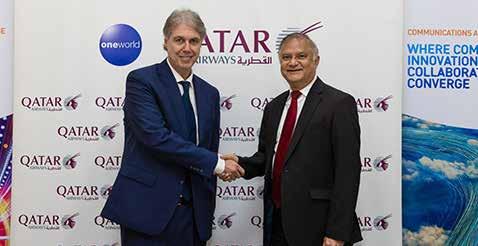
Hani El Asaad, President, Middle East & Africa, SITA, said: “We are delighted to collaborate with Qatar Airways, an industry leader renowned for its commitment to innovation and excellence. Data and connectivity remain the backbone of our industry, and ensuring fast, secure, and reliable
connections are crucial for optimizing airline operations and improving the passenger experience. This partnership marks a significant milestone in the evolution of air travel technology, exemplifying our dedication to transforming travel and transport through cutting-edge solutions.”
SAP SE announced a multiyear partnership with the Mercedes-AMG PETRONAS F1 Team starting in 2024. As an Official Team Partner, SAP is teaming up with the MercedesAMG PETRONAS F1 Team to accelerate operational efficiency and unlock new data insights to deliver performance gains. SAP S/4HANA Cloud, private edition serves as the technology foundation for the team, enabling them to explore how artificial intelligence (AI) and cloud solutions from SAP can help inform and predict decisions, optimize resources and future-proof their IT infrastructure.
Efficiency is the cornerstone of success in Formula One. Therefore, mastering the cost-cap challenge and optimizing the team’s complex supply chain are two areas of focus for this partnership. Formula One’s cost cap restricts how much teams can spend each season, with severe penalties if exceeded. The

With SAP Business AI technology embedded, the team can forecast costs, predict final budget needs, and optimize both
the supply chain and stocked items. To run its state-of-theart operation, the MercedesAMG PETRONAS F1 Team is looking forward to leveraging SAP S/4HANA Cloud, private edition for a secure and future-proof cloud environment. The team can also take advantage of SAP Build solutions and SAP Business Technology Platform to implement a transparent, intelligent enterprise architecture –bringing together a single view of data and systems from various sources across the organization.
Mercedes-AMG PETRONAS F1 Team plans to navigate this complex course by using the SAP S/4HANA Finance solution to allocate, save and use resources more efficiently.ServiceNow released findings of a new study that explored employee sentiment on the impact of technology and digital skills on their career and the future of the workplace. 79% of surveyed UAE employees agreed that digital skills give people an edge in business and an almost equal number (84%) said new technologies are helping them reach their potential.
The study — which surveyed 5,500 working adults (18+) in the UAE, France, Germany, Ireland, Italy, Sweden, Switzerland, the Netherlands and the UK — also highlighted that UAE employees are far more positive about the impact of AI on their jobs, compared to their EMEA peers. Almost three quarters (74%) — a whole 26 percentage points higher than the EMEA average — agree that AI is the biggest opportunity for the future of the workforce. An equal number agreed that AI will boost

Mark Ackerman, Area VP for Middle East & Africa at ServiceNow
productivity in the workforce, while only 52% of EMEA employees shared the same sentiment. Although UAE employees are largely optimistic about the value of tech and digital skills, half of workers (54%) acknowledged that
their formal education did not prepare them for today’s working world and 82% also noted that additional education on technology, digital skills would help them feel more confident about their career prospects.
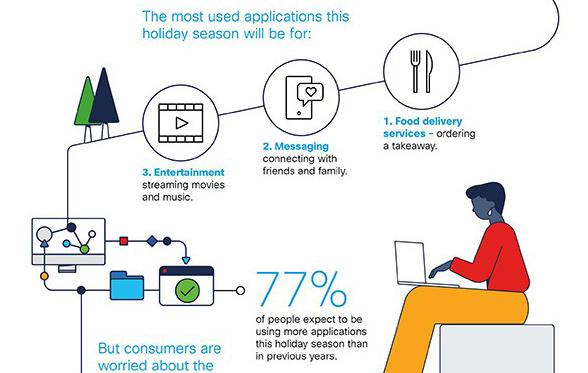
Research published today by Cisco reveals that consumers will be using more applications and digital services over the end-of-year holiday season than ever before. 78% of people in the UAE now believe that applications and digital
services are important to having an enjoyable holiday. But significantly, 65% of the nation’s consumers (considerably higher than the global average of 45%) are concerned that if a digital service doesn’t perform, it will ruin their
seasonal celebrations. Consequently, 63% of consumers in the Emirates say they won’t be able to forgive an application that lets them down over the holiday season. “As brands look to take advantage of record demand for applications over the holidays, the findings provide a stark reminder about the importance of application availability, performance and security,” said James Harvey, CTO Advisor EMEA, Cisco Observability. “The pressure is on application owners in all sectors to ensure that their applications are operating at peak performance during the holidays; people will have zero tolerance for any brand that delivers a bad digital experience.”
Applications will play a central role during the holidays
The research uncovers the breadth of different digital services that people will be using over the holiday season. Whether it’s streaming movies and music, connecting with friends and family, keeping up to date with news, or managing finances, consumers will be relying on a huge number of applications as they celebrate.
Epicor, a global leader of industry-specific enterprise software designed to promote business growth, shared findings from “The Evolving Role of the CFO in 2023,” an IDC InfoBrief sponsored by Epicor. The study revealed more than 80% of manufacturing and distribution organizations surveyed agreed that today’s economic uncertainty has “significantly” elevated the importance of the CFO in driving strategy and technology optimization initiatives. Financial performance and growth were cited as the top IT investment drivers in the current economic climate.
“The back office is not the back office anymore, with CFOs and their finance organizations increasingly playing a more vital role in driving IT investment to compete and grow,” said Marco de Vries, Epicor Vice President of Product Marketing. “It’s all about

transforming the speed and efficiency in decision-making across the business, which is critically important for supply chain industries that have faced continual disruption and economic pressures to adapt and thrive.”
With a heightened focus on data management to drive enterprise agility and real-time decision-making, CFOs are looking for ways to modernize the tools the finance and accounting departments rely on to improve efficiency and business performance.
Foundationally, that includes increased investments in cloud technologies, with half of organisations surveyed planning to move to the cloud in the next one to two years to strengthen data accessibility, reduce organizational silos, and improve security. Top use cases identified for optimization include financial planning and analysis (FP&A), cash management, and accounts payable automation.
It’s shopping season, which can only mean one thing: scores of fake “missed delivery” smishing messages trying to steal our money, data and identities. But there is some good news. Proofpoint data shows that smishing growth has slowed in the past 18 months across many regions, becoming an established part of the landscape rather than a rising threat.
However, the risk remains serious; recent research shows that 66% of organisations in the UAE have reported at least one smishing attempt in 2022. And, in many cases, these attacks are becoming more specialized and devious. New conversational attacks emerge
Over the past year, we’ve seen rapid growth in conversational attacks on mobile. Globally there has been an increase by 318%. These tactics involve attackers sending multiple messages, mimicking the patterns of authentic engagement to build trust.
In some parts of the world, impersonation has become a significant trend. This is where the attacker pretends to be someone the victim knows, such as a family member, friend or

business acquaintance. Impersonation can increase the likelihood of the victim trusting the message and being lured into conversation. One common impersonation tactic being used is to claim to be a child with a lost or broken phone
This is a classic example of social engineering, using parental anxiety to bypass our usual caution. The next step in conversational abuse typically involves persuading the victim to move onto WhatsApp or another messaging service before requesting a money transfer.
W. Stuart Jones, Technical Marketing Director in Proofpoint’s Cloudmark DivisionDelinea published a new report that examines the future of passwords to reveal insights about the evolution of authentication and access in the workplace. The report, titled, “The Future of Workplace Passwords: Not Dead, but Evolving,” found that the majority (68%) of 300 US IT decision makers say that passwords aren’t dead, with over half of that group (53%) stating they believe passwords are simply evolving into something new.
The survey, conducted by Censuswide on behalf of Delinea, specifically aimed to understand the future of passwords in the workplace in light of recent traction by other authentication options in consumer technology such as smartphones, personal email accounts, and mobile apps. The polling found that solutions users are already familiar with using in their personal lives are also the most likely to replace passwords in the workplace, such as biometrics (58%), other multi-factor authentication (MFA) technologies (46%), onetime passwords (37%), and Passkeys (35%).
“The term ‘passwordless’ often elicits a strong response, either by those claiming passwords
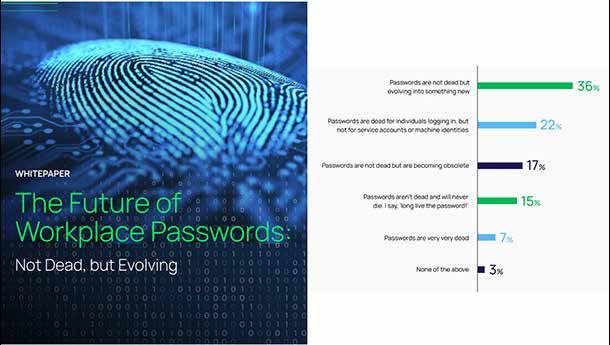
will never die or those claiming they will inevitably go away. Our latest research shows that it doesn’t have to be one or the other, and that a range of authentication options are encouraging a future where passwords still exist but are in the background,” said Chris
Smith, Chief Marketing Officer at Delinea. “The passwordless evolution won’t happen overnight though, and organizations need to ensure that they are taking necessary steps to avoid introducing new risk into the workplace by trying to move beyond passwords too quickly.”
Freshworks announced that The Giving Movement, one of Dubai’s most prominent sustainable clothing brands, uses Freshdesk and Freshchat to manage and automate its customer support operations. Empowered by Freshworks’ products, The Giving Movement has not only successfully addressed its customization requirements but also achieved the milestones it had set out to accomplish.
“Even before we respond to the customer, we know their complete context and history. Freshdesk and Freshchat work well across live chat, email, social chat, and telephone to make this happen for us,” said Sachin Kumar Badrinath, Head Of Customer Experience at The Giving Movement.
The Giving Movement’s vision for quality customer service lies in deep empathy. Badrinath has an email address for customers

who want to talk to leadership instead of agents and routes the voice of customer feedback
through this channel. “This direct line with the support head is unique to this geography and domain. It has led to some great revelations of customer preferences and ultimately adds to our unified picture on Freshdesk,” Badrinath added.
Further, automation features such as IntelliAssign, which assigns the correct language query to the right agent (based on Arabic or English speaking), and the roundrobin assignment method that picks an agent based on availability, have saved agents significant time. Badrinath emphasizes that efficient operations depend on timely task allocation and meaningful data analysis. He shares, “Freshdesk and its analytics features have led us to cross-utilize agents across teams, harness their full potential, measure occupancy rates, and be organized.”
Infoblox revealed that higher network availability generated $500,225 in benefits, including productivity gains, from avoidance of unplanned downtime. That’s one of the major findings from a new Forrester Consulting study commissioned by Infoblox, which contains insights from 34 surveyed organizations and five interviewed customers, underscoring the critical nature of Domain Name System as a critical network service for modern enterprise IT infrastructure.
DNS is the system that translates userfriendly URLs into numerical IP addresses. It is a crucial component of daily internet operations, but it is often overlooked and unprotected, leaving it vulnerable to a variety of malicious attacks such as phishing, smishing, spoofing, amplification, and Distributed Denial of Service (DDoS). Comprehensive DNS oversight is vital for maintaining business continuity, securing online services against cyber threats.
When the critical network services of DNS and DHCP are disjointed and manual, unplanned downtime and business disruption

are inevitable. Among the leading causes of unplanned network downtime are lack of visibility, lack of data synchronization, IP conflicts, and DNS inconsistency across different cloud environments, emphasizing the need for improved security, management, and automation of DNS services. The study findings are designed to aid IT leaders in evaluating the potential return
on investment and operational improvements from automated DDI (DNS, DHCP, and IPAM) services delivered by Infoblox.
Organizations that moved their core networking services to consolidated and automated environments with Infoblox DDI (DNS, DHCP and IPAM) saw $7.1 million in savings within three years of deployment.
Sharjah Electricity, Water and Gas Authority announced its successful digital transformation powered by global technology company SAP SE. By implementing a comprehensive portfolio of SAP solutions including enterprise resource planning (ERP), HR management and industry-specific applications, SEWA will automate business processes, increase efficiencies and visibility over all areas of operations, and enhance services to employees, customers and partners.
Among the solutions that have been deployed are SAP S/4HANA, an ERP solution, industry specific modules such as IS Utilities, SAP Asset Manager, SAP Business Technology Platform, and for human resource management, SAP SuccessFactors. As the first utilities organization in the UAE running live on SAP S/4HANA, the implementation was

exceptionally accelerated and leveraged SAP Model Company for Utilities.
H.E. Abdullah Abdul Rahman Muhammad Obaid Al Shamsi, Director-General of SEWA, commented, “The digital transformation is in line with SEWA’s motto of being ‘reliable, efficient and sustainable’ in all our actions. Leveraging SAP’s advanced technologies and global best industry practices, this transformation ensures we continue to enhance our services, increase efficiency, and attain the highest possible quality and safety
standards. The benefits of real-time reporting, reduced month-end closing time, and automating processes to ensure bill accuracy and provide a seamless mobile experience, including app-based meter reading, will benefit our customers directly. Automation will also enable our employees to focus on their core functions, while the deployment of SAP SuccessFactors aims to enhance our employee experience and development, ensuring we have an engaged and motivated team.”
Acer unveiled Conscious Technology vision for technology designed and made with consideration for the future. It also shared its ongoing climate efforts, while a showcase of two new energy storage solutions and a climate exhibition featuring technology and product concepts were made open to the public. Acer has joined the RE100 initiative and committed to sourcing 100% renewable electricity by 2035. It has also pledged to achieve net-zero emissions by 2050. As one of the world’s top ICT companies, Acer seeks to amplify positive impacts on the environment through united actions; 60% of its critical suppliers have committed to RE100 or set science-based carbon reduction targets (SBT). Acer has set a goal to use 20-30% post-consumer recycled plastic in its computer and monitors by 2025, for which 17% use was achieved in 2022.
Some of the efforts that Acer shared at the event include its Vero line of products made with a high percentage of recycled materials, the Project Humanity initiative that educates and unites its employees around the world to

take greener actions. “We must speed up the adoption of renewable energy to fight climate change caused by global warming,” said Acer Chairman and CEO Jason Chen. “In 2022, the Acer Group reached 44% of renewable electricity usage. To reach our goal of 100%
solar and wind power utilization in energy storage technology will be the key. We are taking decisive actions that advocate circular economies and providing solutions that minimize the negative impacts on our environment.”
Nutanix announced it has been named a Leader in The Forrester Wave: Hyperconverged Infrastructure, Q3 2023, published by Forrester Research. The report evaluated 11 HCI vendors on Current Offering, Market Presence, and Strategy, and Nutanix was positioned as a leader with the highest possible scores in the vision and innovation criteria. Nutanix also received the highest scores in the storage and data, and support and experience criteria. Nutanix believes these results show the company’s strength in helping organizations build a hybrid multicloud platform to run all apps and data anywhere – whether in the datacenter, in public cloud or at the edge. “Most organizations are grappling with the messy, accidental multicloud reality of managing applications and data across
multiple clouds and on-premises, resulting in operational complexity, increased costs and security risks,” said Thomas Cornely, SVP, Product Management at Nutanix. “Nutanix addresses these challenges with one platform to run applications and data anywhere. To us, this report underscores our leadership in this market and recognizes our strong offering and vision to help customers simplify their hybrid multicloud environments.” The Forrester Wave report ranked Nutanix as a leader and states, “Nutanix is known for simplifying infrastructure complexity and is applying that philosophy to hybrid cloud infrastructure as well.” It also notes, “The Nutanix vision focuses on building a hybrid and multicloud platform for business applications, easing adoption of cloudnative architecture.”
 Thomas Cornely, SVP, Product Management at Nutanix
Thomas Cornely, SVP, Product Management at Nutanix
Qualys, a cloud-based IT, security and compliance solutions leader, unveiled its forward-looking vision of the Qualys Enterprise TruRisk Platform, a move that marks a seismic shift for the future of Qualys as a leader in managing and reducing cyber risk for CISOs as well as security practitioners. The Qualys Enterprise TruRisk Platform centers around helping customers holistically measure, effectively communicate, and proactively eliminate cyber risk, with a hyper focus on the impact of cyber risk on business risk. With ever-expanding attack surfaces and a growing threat landscape, cyber risk has become an elevated topic of importance and prominence for virtually every organization, especially for the C-suite. Today, nearly 50% of CISOs report directly to the CEO, with over 90% regularly briefing their Board of Directors about their organization’s exposure to cyber risk. “Despite a market push to release more cyber risk ‘measurement’ solutions, security leaders and stakeholders have no reliable means of aggregating, correlating, and translating cyber signals from a growing cybersecurity stack into meaningful cyber risk mitigation and
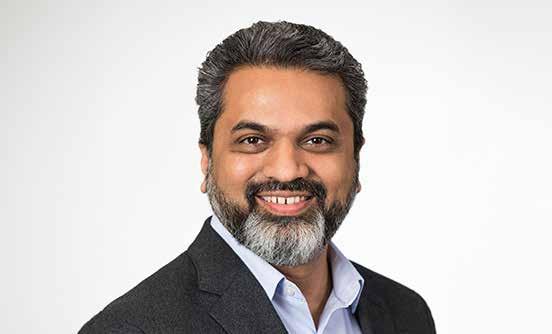 Thakar, CEO, Qualys
Thakar, CEO, Qualys
remediation strategies,” said Sumedh Thakar, Qualys CEO. “The Qualys Enterprise TruRisk Platform addresses this issue head-on by delivering a centralized way for organizations to measure and eliminate their cyber risk and arms users with the actionable insights they
need to communicate their actual cyber risk posture to internal security and business risk stakeholders. It also provides external executive stakeholders, from the board to cyber risk insurers, with the necessary data they need to make the right decisions.”
Microsoft is reimagining cloud infrastructure to ensure optimization across every layer of its hardware and software stack with over 100 news announcements unveiled at Microsoft Ignite 2023. The advancements touch on multiple layers of an AI-forward strategy, from adoption to productivity to security, all designed to empower Microsoft customers, partners, and developers to reshape the future of work. New innovations across Microsoft’s datacenter fleet include ‘Microsoft Azure Maia’, an AI Accelerator chip designed to run cloud-based training and inferencing for AI workloads such as OpenAI models, Bing, GitHub Copilot and ChatGPT. ‘Microsoft Azure Cobalt’ is a cloud-native chip based on Arm architecture optimized for performance, power efficiency and cost-

effectiveness. Both chips will start to roll out early next year. Microsoft also announced the
general availability of Azure Boost, a system that makes storage and networking faster by moving those processes off the host servers onto purpose-built hardware and software. The company is also expanding partnerships with its silicon providers to help meet the growing demand for efficient, scalable and sustainable compute power and the needs of customers eager to take advantage of the latest cloud and AI breakthroughs. Ihab Foudeh, General Manager, Microsoft Middle East, said that organizations of all sizes across the Middle East are looking to leverage the latest technologies to help them add more value to their business. “The cutting-edge advancements unveiled at Microsoft Ignite 2023 mark a pivotal moment in the evolution of cloud infrastructure
SumedhSolarWinds announces major enhancements in its Database Observability capability within the cloud-based SolarWinds Observability platform. SolarWinds Database Observability provides full visibility into open-source, cloudenabled, and NoSQL databases to identify and address costly and critical threats to their systems and business. Database Observability is part of the SolarWinds Database Performance Management portfolio, which includes SQL Sentry and Database Performance Analyzer. With the new capabilities, SolarWinds now offers one of the most comprehensive Database Performance Management portfolios in the industry. Database performance is critical to the success of an organization’s IT strategy and business operations. However, databases also lead to some of the most complex challenges that IT teams face due to the complicated, businesscritical, and difficult-to-diagnose issues they often present. Without complete and precise database monitoring and observability, IT and DevOps teams struggle to accurately diagnose the root cause of performance issues—risking costly downtime, decreased quality of service delivery, and other critical threats to health
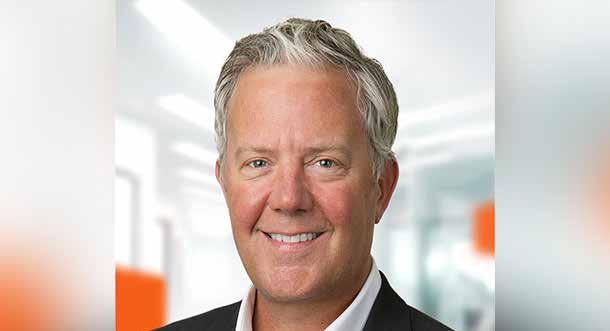
and growth potential of the entire enterprise. The SolarWinds Database Observability offering is built for the needs of the modern enterprise environment and helps ensure optimal performance by providing full, unified visibility and query-level workload monitoring across centralized, distributed, cloud-based,
and on-premises databases. Organizations armed with SolarWinds Database Observability enhance their ability to understand database implications as new code is deployed, utilize realtime troubleshooting of database performance issues, and isolate unusual behavior and potential issues within the database.
NetApp updates unified data storage with new block storage, improvements to Storage-as-a-Service
NetApp announced several updates to the industry’s only unified data storage solution including new block storage products driving unmatched savings and sustainability, multiple improvements to public cloud storage services, and updates to NetApp Keystone Storage-as-a-Service — all designed to drive simplicity, savings, security, and sustainability for customers. Over two decades ago, NetApp introduced unified storage to the industry. Today, NetApp extends the definition of unified data storage to an entire architecture that enables file, block, and object workloads. Unified data storage provides a common storage operating system that spans multiple on-premises storage offerings and every major public cloud, unified by a common API set and single control plane. This includes the leading

unified all-Flash storage, NetApp AFF, the new block-optimized allFlash storage, NetApp ASA, and the only firstparty, cloud-native storage solutions running on all of the three largest public clouds with Amazon FSx for NetApp ONTAP, Microsoft Azure NetApp Files, and Google Cloud NetApp Volumes. “As we unveil updates to our enterprise-grade storage portfolio, we’re setting the stage for a transformative era in data management,” said Harv Bhela, Chief Product Officer at NetApp. “NetApp’s portfolio, spanning on-premises and all major public clouds, reinforces our dedication to customers to deliver unified storage solutions that meet the evolving needs of modern enterprises and provide unmatched simplicity, savings, security, and sustainability.”
Cullen Childress, Senior Vice President at SolarWinds Harv Bhela, Executive Vice President and Chief Product Officer at NetAppStreamline their IT infrastructure and improve operational efficiency, which can result in lower costs and increased productivity.

Assess your current capabilities architecture and identify areas for improvement, helping you to make informed decisions about where to invest your technology resources

Optimize and improve your technology systems, ensuring they are operating at peak efficiency and effectively supporting your business goals.

Provide advanced analytics services, leveraging the latest technologies and techniques to help you turn your data into actionable insights.
Develop a digital strategy that aligns with your business objectives, enabling you to stay ahead of the curve in a rapidly changing digital landscape.



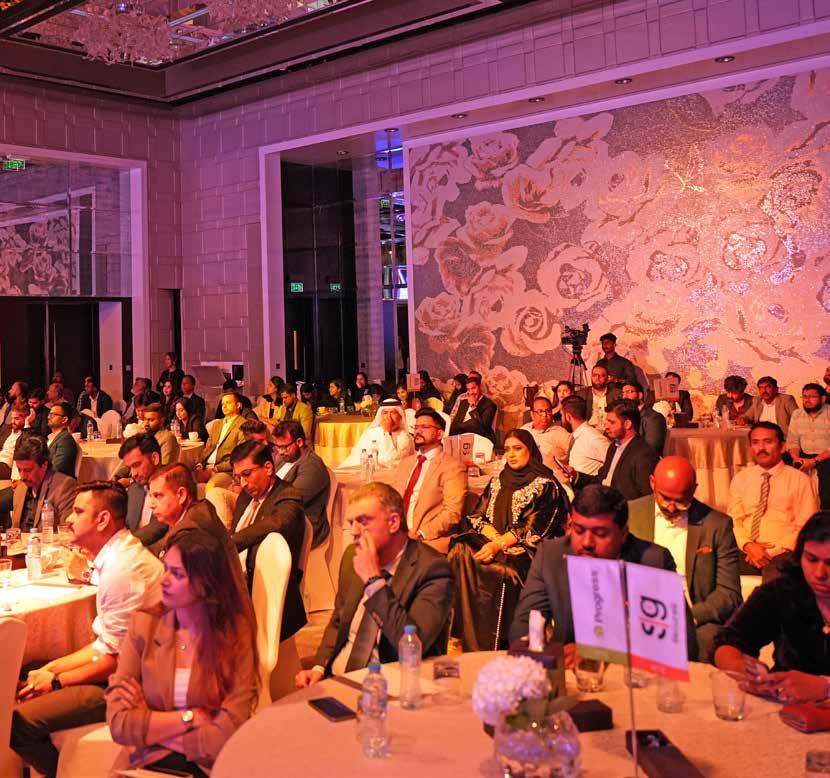


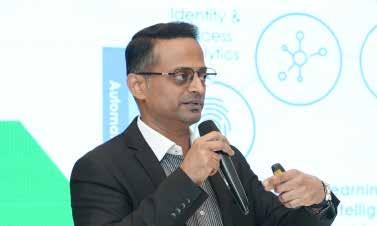
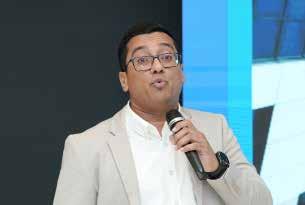
In the heart of Saudi Arabia, the Channel Partners Conclave and Awards (CPCA) unfolded as an unprecedented gathering of cybersecurity luminaries, thought leaders, and enthusiasts. This momentous event, presented by the GEC Media Group and fueled by Spire Solutions, emerged as a pivotal exploration into the forefront of digital security, leaving an indelible mark on the ever-evolving landscape of cybersecurity. As the title sponsor in KSA, Spire Solutions assumed a commanding role, acting as the beacon guiding the industry toward excellence in cybersecurity. Their unwavering commitment permeated every aspect of the event, solidifying their standing as industry leaders steering the narrative of digital security.


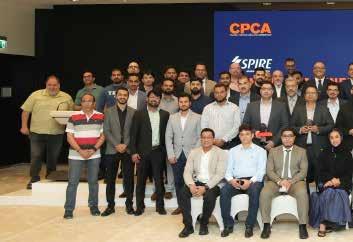
The event commenced with riveting sessions, each unveiling critical facets of cybersecurity Integration and Collaboration Spotlight: Prasanth Prasad, representing Spire Solutions, took center stage, emphasizing the transformative power of integration and collaboration in navigating the intricate cyber threat landscape. Unified efforts took precedence, acknowledged as a requisite for building robust cybersecurity measures.
Muhammed Rehan, Business Unit Head at Spire Solutions, embarked on a comprehensive exploration of safeguarding applications through robust API security measures. Attendees gained profound insights into the pivotal role of API security in fortifying digital landscapes.
Mohan Raj, a representative of Gurucul, presented a compelling perspective on how artificial intelligence enhances human-centric security teams. The session provided a glimpse into the evolving strategies of cybersecurity in an era dominated by advanced technologies.
Sameh Sabry of Conceal delved into the crucial role of AI and machine learning in elevating browser security. Attendees absorbed valuable
insights into emerging trends shaping browser security protocols and learned how cutting-edge technologies are shaping the future.
Ahmad Halabi, from Resecurity, provided a deep understanding of intelligence operations and their critical role in mitigating evolving cyber threats. The session equipped participants with a comprehensive understanding of the strategic use of intelligence in the dynamic landscape of cybersecurity.
The grand culmination of the event was an awards ceremony that honored outstanding contributions and innovations in the cybersecurity arena. Industry trailblazers and rising stars were celebrated for their relentless dedication to enhancing digital security, underscoring the commitment of the cybersecurity community.
Beyond the insightful sessions, attendees engaged in enriching conversations during networking sessions, fostering meaningful connections within the cybersecurity community. The event crescendoed with a celebratory dinner, providing a relaxed environment for continued discussions and relationship-building.
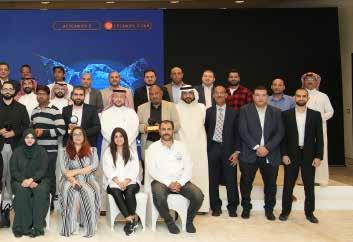
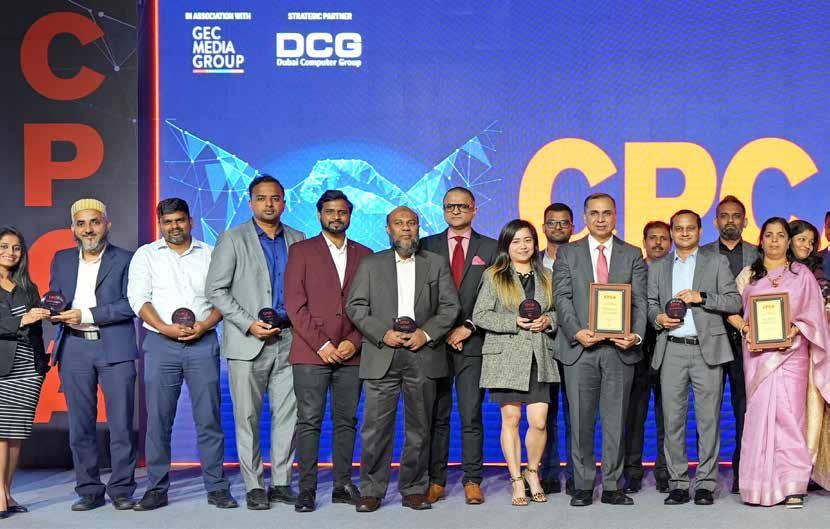
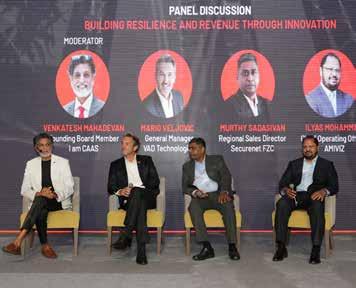


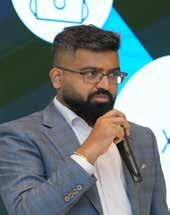


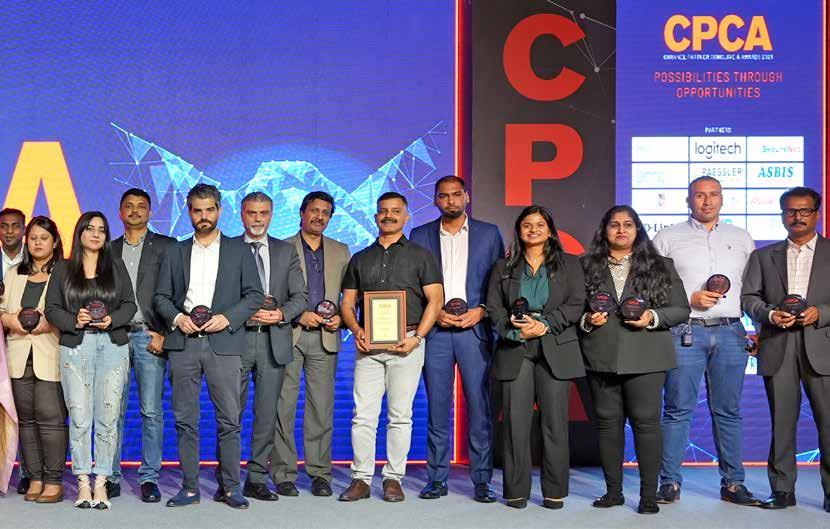
As the sun set on the CPCA event in KSA, attention turned to the future.
An announcement resonated through the cybersecurity community— Channel Partner Conclave & Awards 2023, UAE Edition was on the horizon. The anticipation was palpable as the ceremony unfolded, with industry leaders, visionaries, and enthusiasts eagerly participating.
The CPCA journey seamlessly transitioned to the UAE, where the fervor and enthusiasm of the cybersecurity community remained undiminished. The event unfolded with Dharmendra Sawlani, President, and Board Member of Dubai Computer Group, unveiling the future of tech in the opening keynote at #CPCA.
Trixie LohMirmand, Executive Vice President of Dubai World Trade Centre, captivated the audience with her opening address at the CPCA Awards in the UAE. Her words ignited the spirit of excellence and achievement, setting the stage for an evening dedicated to innovation.
A panel discussion, moderated by Dharmendra Sawlani, delved into the intricacies of ‘The Channel Power’ at the CPCA event in the UAE. Industry experts Hesham Tantawi, Vice President at ASBIS Middle East, and Anand Choudha, Serial Entrepreneur, actively contributed their expertise to decipher the evolving landscape of channel dynamics.
Logitech, provided participants with insights into the latest trends and innovations redefining the way we work.
A panel discussion on ‘Building Resilience and Revenue Through Innovation,’ led by Venkatesh Mahadevan - FBCS, Founding Board Member of I am CAAS, featured industry experts sharing invaluable insights into navigating challenges and driving revenue growth through cutting-edge solutions.
The session on ‘Sustainable ICT: Green Technologies and Practices,’ guided by Tim D., Country Manager - Middle East Region at CONTEXT, explored eco-friendly innovations shaping the future of information and communication technology.
In retrospect, the CPCA in KSA and the subsequent UAE Edition not only celebrated cybersecurity excellence but also served as a testament to the collaborative spirit and innovative prowess defining the future of technology. As the cybersecurity community continues to evolve, events like the CPCA play a crucial role in uniting, inspiring, and propelling the industry forward. The symphony of cybersecurity brilliance echoes, leaving an indelible mark on the chronicles of digital security across borders.
A Vendor Speaking session on ‘Smart Workspace,’ led by Azeem Mohammed, B2B leader, GCC Region,
VAST Data is revolutionizing the data platform landscape with a visionary approach tailored for the AI era.
VAST Data is creating a new category of data platform, built for the AI era. The VAST Data Platform unifies storage, database, and containerized compute engine services into a single, scalable software platform architected from the ground up to power AI and GPU-accelerated tools in modern data centers and clouds. The platform uniquely enables organizations to understand all data, both structured and unstructured as it exists in the natural world, to generate superior insights and unlock new value.
Generative AI and large language models have created a significant paradigm shift in the market, such that has every enterprise has had to assess their artificial intelligence strategy. Powered by machine learning and deep learning algorithms, this new era is defining how organizations store, manage, process and interact with their data.
VAST Data is delivering modern AI infrastructure to enable deep learning, and helping organizations to take advantage of all of their data to train the next generation of AI models that will speed up innovation
and discovery across every industry.
VAST’s partnership with G42 Cloud (now Core42) fits perfectly with the UAE’s ambitious AI strategy. It gives businesses in the MENA region access to a platform that is fast, scalable, secure, resilient, and offers access to their entire data set from the edge to the cloud. VAST is changing the way data systems work, giving businesses more power, and leading a major move in AI computing.
The market for AI data platforms in the Middle East, Turkey & Africa region is growing rapidly, mainly due to the rise in demand to deal with unstructured data, mixed-use of multi-cloud strategies and the power of generative AI apps like ChatGPT. In the next 5-10 years, AI and quantum computing will enable new discoveries and help to solve problems that humanity has struggled with for decades. However, in order to take full advantage of these technologies, data intensive organizations will require the right infrastructure to deliver on the promise of AI, offering immense
impact to help find treatments for disease, new paths to deter climate change, etc.
VAST Data is at the top of this changing data management ecosystem. The VAST Data Platform handles huge amounts of data quickly, works well in a variety of settings, and puts environmental concerns first. As AI continues to change the tech world, data platforms will be key to releasing their full potential and fostering innovation in the Middle East, Turkey & Africa area and beyond.
Quantum-powered AI is poised to lead to breakthrough solutions for hard problems in many scientific and business areas that are currently beyond the reach of traditimetaonal computers and AI techniques.
In order to do this, organizations will require ability to harness unstructured data with an enterprise-grade data platform that delivers HPC performance efficiently at scale. By AI
Haidar Aziz, Managing Director Middle East, Turkey and Africa at VAST DataGenerative AI and large language models have created a significant paradigm shift in the market.
and Machine Learning algorithms are perfect candidates for quantum processing.
The quantum-powered AI organization can use quantum optimization techniques to accelerate drug discovery and analysis in important areas such as healthcare. Furthermore, by managing high-dimensional data, quantum AI could have a transformative impact improving cybersecurity and financial services.
Newer quantum-inspired algorithms show potential for improving forecasts, creating new content, and making better decisions, which could lead to advancements across these critical industries.
Furthermore, developers are working to improve the infrastructure that allows classical and quantum computers to interact smoothly with one another.
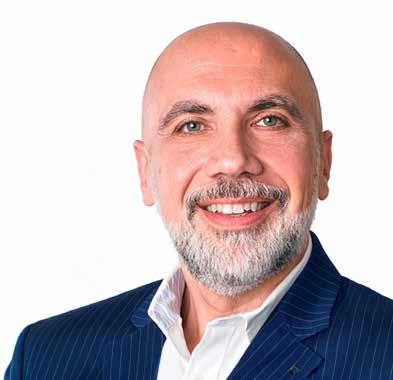
VAST Data is at the forefront of the AI era in the Middle East, Turkey & Africa region, with its one-of-a-kind platform built from the ground up for AI, offering unmatched scale, speed, and resilience. VAST’s mission is to deliver a new category of infrastructure that puts data at the center of how systems think, react, and discover. This breakthrough will empower organizations to effectively address their most pressing data challenges, enabling unprecedented advancements in technology, economics, social dynamics, and scientific research.
VAST’s success comes from always putting the customer needs first and helping to remove the barriers and challenges that today’s datacentric enterprises face. As the Middle East, Turkey & Africa region continues to lean into the transformative power of AI and other datadriven technologies, VAST Data will play a key role in enabling this future.
VAST’s commitment to a sustainable and
equitable digital future remains a top priority. The company’s Sustainability Report, which details the company’s sustainability initiatives and progress, demonstrates how the VAST Data Platform helps customers achieve a remarkable 90% energy savings over the course of a 10-year span, contributing significantly to carbon emission reductions.
In addition to leveraging flash-based storage, known for its lower power consumption and reduced heat generation compared to traditional disk drives, VAST’s Similarity uses advanced, AI-driven data reduction techniques to drive even more energy efficiencies by eliminating excessive data and decreasing storage capacity requirements. The disaggregated architecture allows independent scaling of compute and storage, preventing resource overprovisioning and optimizing energy usage.
In a nutshell, the VAST Data Platform offers the potential to assist data centres in conserving energy, lowering CO2 emissions, and cutting costs.

In the age of digital living, where ecommerce trends shift with the speed of same-day deliveries, a survey across Europe, the Middle East, and Africa reveals a seismic change in consumer loyalty.
Once we all started living digitally, it was only a matter of time before market trends reflected the flexibility of the ecommerce world. Just as orders can be fulfilled in a fraction of the time, so can consumer tastes twist and turn in the breeze. If a competitor finds a way to give same-day delivery, so must you. If a competitor offers buy-now-paylater (BNPL), so must you. The same applies to engagement channels and customer experiences of all types.
In a survey of 13,000 consumers across Europe, the Middle East, and Africa (EMEA), ServiceNow and Opinium found that shoppers are prioritizing experience more and more. 79% of UAE consumers expected brands to know their purchasing habits and 91% wanted this individualization reflected in the discounts they were offered. Privacy also loomed large as almost all (93%) of consumers in the Emirates agreed that a good level of security for personal data would be a prerequisite. But regional shoppers haven’t forgotten about price; 37% indicated they would switch brand for a better deal.
The sum total of all this is a UAE consumer base that is, on average, 91% less loyal to brands than it was two years ago — a whopping 15 percentage points higher than the EMEA average. A change of this magnitude is a cry for back-to-the-drawing-board thinking. Something must be done if your organization is to remain relevant. But what? An organizational reshuffle? Territorial expansion? Rebranding? Here, I shall argue that it is none of these. I submit that the answer is good old seamless service and rapid results — a customer experience that can deliver the transition from “Meh” to “Wow”.
Our EMEA research could not be clearer on one point. Almost all UAE customers (94%) told our researchers that they gravitate towards businesses that can resolve their issues quickly and efficiently. If you are thinking that sounds like a job for a technology platform, you would not be alone. For almost two decades, the region has been investigating ways of using tech to do more with less — less resources, less human capital,
and less training. And while many technologies have risen up to fill that void, the roundest of all pegs is AI. An AI-powered customer experience is the shining castle on the hill. And it is finally within our grasp.
Think about what customers have always wanted — a frictionless journey from initial engagement to after-sales service. AI can automate processes, minimize repetition, and reduce complexity. And it can immensely improve the employee experience, taking over tasks such as email composition and data gathering.
Before we get too carried away with supplanting our human workforce, we should note that many modern customers do not crave a 100%-automated experience. Our research found you can hurt your brand by withholding the option for one-to-one human interaction. More than one in three EMEA respondents (37%) respondents fall into this category, so we must allow for human-AI balance. And a
Ali Kaddoura, Country Manager – UAE, ServiceNowAI can automate processes, minimize repetition, and reduce complexity.
separate study by IPA Research shows almost three in four consumers want to know when they are dealing with AI. The AI-human combo is a tempting one, but we must walk a tricky line to have it translate into a delightful customer experience. Automate where appropriate, allow for interaction with human agents when requested, and be open about the choice with your customers. Tell them if they are conversing with a bot and let them know about any data being used in the process.
We have all been consumers, so the journey is easy to visualize. We can visualize the bad examples because we have been through them, and we can visualize the good ones, even if we have not encountered them yet. Virtual agents are the gatekeepers. They point us to the right products, answer common questions, and facilitate many workflows. But that is just the beginning. Any business you can imagine in any industry you have ever heard of can reap bountiful boons from AI when it is introduced
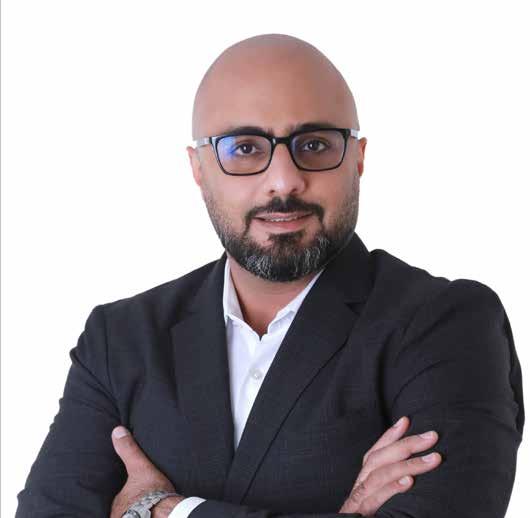
to its customer experience — predictive maintenance, automatic contract-creation, advanced analytics, and more.
Across the region, we frequently hear of the advancements in the FSI sector brought about by AI. Access to systems can be automated, especially as FSI human agents commonly access some systems only once a month. Virtual assistants can guide them, which will lead to less tickets raised with the helpdesk and a lower burden on the admin team. With issues resolved before they even occur, financial institutions enjoy significantly streamlined operations.
AI and its subsidiaries — like naturallanguage-processing, robotic process automation (RPA), and advanced analytics — are generalized enough to find homes in almost any business use-case. However, solutions will vary with those use cases, so organizations should take care to explicitly establish what problem is being solved and then select the right AI to solve it rather than being dazzled by a specific technology and adopting it for novelty’s sake. Pick the right partner, draw
up a plan that makes sense to the business, its ambitions, its regulatory obligations, and its ESG and ethical visions.
Any strategy should start with data. What data is available internally will dictate the limits of use cases. Your AI partner can then guide you in ensuring your data is accurate, accessible, and conforms to ethical contours — by being free of bias, for example. They can ensure you are taking a step to reduce complexity, rather than adding more of it. And they can advise on cybersecurity provisions that reduce risk. Through collaboration with your technology partner, you will have laid the foundation for all the items on the regional consumer’s wish list — speed, accuracy, security, choice, individualization, and a dozen things today’s shoppers have yet to ask for.
Holistic, connected systems that futureproof your enterprise while delighting the customers of today and the employees that serve them—–with the right vision, and will, this can be yours.

As enterprises embrace AI, a focus on proven variants alongside the allure of the latest technologies becomes imperative, ensuring a nuanced approach that aligns with business missions and optimizes the multifaceted potential of artificial intelligence.
Artificial intelligence (AI) has rapidly evolved to become a defining force in the modern zeitgeist. In just a few years, the questions being asked about AI in boardrooms have shifted from “Why should we adopt?” to “When should we adopt?” to “How do we adopt?” to “Why have we not already adopted?”. This latest attitude is one that seems to be especially pertinent to generative AI, the new tech sensation that has gripped the imagination and launched a thousand conversations about efficacy, integration, privacy, and security.
Chatting naturally with a generative AI tool like ChatGPT is a mesmerizing experience. And yet we seem to have forgotten about the established and proven variants of AI in the face of the generative generation. Remember that PwC prediction of a US$320-billion impact on the Middle East economy from AI by 2030? It predated ChatGPT,
Google Bard, and Bing AI. We have been living the AI revolution for some time now, and for enterprises to make sure they share in that multibillion-dollar windfall, they must avoid the trap of adopting the latest thing simply because it is the latest thing. They must shake off the gen-AI hype and get back to business, asking things like “What is our mission?”, “How do we do it better?”, and “How do we pick the right flavor of AI to help us get there?” What follows are some use cases that should help focus the mind.
Sifting through what humans could never accomplish in a thousand years is quintessential AI. Deep learning (DL) is a type of machine learning that uses artificial neural networks to crunch numbers at scale. Indeed, given enough data, these algorithms outperform baseline machine learning.
DL can be used for a range of analytics use cases based on its ability to extract complex features and entity relationships from data. It is good at conversational tasks (understanding and speech) as well as image and video processing, even saving scientists from hours of eyeballing specimens under a microscope by taking over and doing the task significantly more quickly. It is no exaggeration to say that this speeds up innovation, and not just in science. Any industry that places a premium on such R&D will benefit. Deep learning also brings value to customer service. It improves everything from the individualization of digital experiences to the parsing of documents.
While large-language models, like ChatGPT & Co., fall into this category, NLP is so much more than LLMs. Many technologies oil the gears of understanding between computers and humans. Any speech-to-text tool uses NLP, but most predate the widely available LLMs of recent months. Virtual chatbots are another application. Virtual assistants have the capacity to enhance employee productivity. Effective semantic translation tools enable more effective

Sifting through what humans could never accomplish in a thousand years is quintessential AI
collaboration in multicultural workplaces across the region. And the Middle East’s digital natives can get access to much-vaunted self-service experiences. NLP can also sift through tens of thousands of feedback forms, emails, online reviews, and social posts in search of patterns and insights; sentiment analysis gives brands and their marketing teams a huge leg up.
When statistics and ML team up, we get predictive analytics (PA). Meaningful patterns found in historical data are powerful indicators of what is to come. If they duplicate certain determining factors, decision makers will see the probability of the recurrence of previous
results. They can take informed action, which allows them to capitalize on positive predictions or avoid the worst impacts of negative forecasts. You anticipate a demand spike, so you top up your inventory. You foresee a dip in energy needs, so you dial down your consumption. Healthcare organizations can personalize wellbeing plans for patients. Manufacturers and utilities can get ahead of equipment breakdowns. Insurance underwriters can finetune assessments.
This is a type of deep learning used to process images for various use cases. A neural network consumes a huge dataset of images, assimilates human guidance, and learns. Advanced CV models can spot safety hazards on live CCTV footage. Autonomous vehicles know the difference between a brick wall and another moving vehicle. And production lines can automate QA by allowing a CV module to look for defects and flag them. While all these examples can be fulfilled by a human, CV does it faster and more accurately.
The right stuff
AI adoption is on the rise and on course to fulfil PwC’s projections. As some wring their hands over job losses, we should note that, to date, AI is being widely adopted to improve employees’ experiences rather than replace them. According to McKinsey, as of May 2023, 62% of GCC organizations use AI in at least one business function, so adoption is well underway and shows no sign of slowing. Doom-and-gloom predictions of supplanted workforces, in Endava’s view, are overblown and fail to account for generational norms where younger, tech-savvy workers expect to be supported by advanced, relevant technology (not necessarily generative AI).
In all the use cases above, I show how human-centric AI can supercharge the journey to the fulfilment of business goals. Generative AI has many applications, and some of them will fit use cases in a range of Middle East businesses. But it would be a mistake to be so focused on this single segment that you miss the impactful opportunities that other forms of AI present.
Laith Al-Bazirgan, Digital Evangelist at Endava
Artificial Intelligence has surged into the corporate spotlight, fueled by substantial investments and strategic initiatives from industry leaders.
As a technology with huge but unrealised potential, AI has been on the corporate agenda for a long time. This year it has undoubtedly gone into overdrive, due to Microsoft’s $10 billion investment in OpenAI, together with strategic initiatives by Meta, Google and others in generative AI. Although we’ve seen many advances in AI over the years, and arguably just as many false dawns in terms of its widespread adoption, there can be little doubt now that it’s here to stay. As such, now is the time for CTOs and IT teams to consider the wider implications of the coming AI driven era.
In terms of its likely impact on the technology sector and society in general, AI can be likened to the introduction of the relational database, in that it was the spark that ignited a widespread appreciation for large data sets — resonating with both end users and software developers. AI and ML can be viewed in the same terms as they provide a formative foundation for not only building powerful new applications, but also enhancing and improving the way we engage with groundbreaking technology alongside large and disparate datasets. We’re already seeing how these developments can help us solve complex problems much faster than was previously possible.
To understand the challenges that AI presents from a data storage perspective, we need to look at its foundations. Any machine learning capability requires a training data set. In the case of generative AI, the data sets need to be very large and complex, including different types of data. Generative AI relies on complex models, and the algorithms on which it is based can include a very large number of parameters that
it is tasked with learning. The greater the number of features, size and variability of the anticipated output, the greater the level of data batch size combined with the number of epochs in the training runs before inference can begin.
Generative AI is in essence being tasked with making an educated guess or running an extrapolation, regression or a classification based on the data set. The more data the model has to work with, the greater the chance of an accurate outcome or minimising the error/cost function. Over the last few years, AI has steadily driven the size of these datasets upwards, but the introduction of large language models, upon which ChatGPT and the other generative AI platforms rely, has seen their size and complexity increase by an order of magnitude. This is because the learned knowledge patterns that emerge during the AI model training process need to be stored in memory — which can become a real challenge with larger models. Checkpointing large and complex models also puts huge pressure on underlying network and storage infrastructure, as the model cannot continue until the internal data has all been saved in the checkpoint, these checkpoints act as restart or recovery points if the job crashes or the error gradient is not improving.
Given the connection between data volumes and the accuracy of AI platforms, it follows that organisations investing in AI will want to build their own very large data sets to take advantage of the unlimited opportunities that AI affords. This is achieved through utilising neural networks to identify the patterns and structures within existing data to create new, proprietary content. Because data volumes are increasing exponentially, it’s more important than ever that organisations can utilise the densest, most efficient data storage possible, to limit sprawling data centre footprints, and the spiralling power and cooling costs that go with
them. This presents another challenge that is beginning to surface as a significant issue — the implications massively scaled-up storage requirements have for being able to achieve net zero carbon targets by 2030-2040.
It’s clear that AI will have an impact on sustainability commitments because of the extra demands it places on data centres, at a time when CO2 footprints and power consumption are already a major issue. This is only going to increase pressure on organisations, but it can be accommodated and managed by working with the right technology suppliers. The latest GPU servers consume 6-10kW each, and most existing datacentres are not designed to deliver more than 15kW per rack, so there is a large and looming challenge for datacentre professionals as GPU deployments increase in scale.
Some technology vendors are already addressing sustainability in their product design. For example, all-flash storage solutions are considerably more efficient than their spinning disk (HDD) counterparts. Some vendors are even going beyond off the shelf SSDs, creating their own flash modules which allow all-flash arrays to communicate directly
 Alex McMullan, CTO International, Pure Storage
Alex McMullan, CTO International, Pure Storage
Data centres are now facing a secondary but equally important challenge that will be exacerbated by the continued rise of AI and ML
with raw flash storage, which maximises the capabilities of flash and provides better performance, power utilisation, and efficiency.
As well as being more sustainable than HDD, it’s also a fact that flash storage is much better suited to running AI projects. This is because the key to results is connecting AI models or AI powered applications to data. To do this successfully requires large and varied data types, streaming bandwidth for training jobs, write performance for checkpointing (and checkpoint restores), random read
performance for inference and crucially it all needs to be 24x7 reliable and easily accessible, across silos and applications. This set of characteristics isn’t possible with HDD based storage underpinning your operations, all-flash is needed.
Data centres are now facing a secondary but equally important challenge that will be exacerbated by the continued rise of AI and ML. That is water consumption, which is set to become an even bigger problem — especially when you take into consideration the continued rise in global temperatures.
Many data centres utilise evaporative cooling, which works by spraying fine mists of water onto cloth strips, with the ambient heat being absorbed by the water, thus cooling the air around it. It’s a smart idea but it’s problematic, given the added strain that climate change is placing on water resources — especially in built-up areas. As a result, this method of cooling has fallen out of favour in the past year, resulting in a reliance on more traditional, power intensive cooling methods like air conditioning. This is yet another
reason to move to all-flash data centres, which consume far less power and don’t have the same intensive cooling requirements as HDD and hybrid.
As AI and ML continue to rapidly evolve, the focus will increase on data security (to ensure that rogue or adversarial inputs can’t change the output), model repeatability (using techniques like Shapley values to gain a better understanding of how inputs alter the model) and stronger ethics (to ensure this very powerful technology is used to actually benefit humanity).
All these worthy goals will increasingly place new demands on data storage. Storage vendors are already factoring this into their product development roadmaps, knowing that CTOs will be looking for secure, high-performance, scalable, efficient storage solutions that help them towards these goals. The focus should therefore not be entirely on the capabilities of data storage hardware and software, the big picture in this case is very big indeed.

In the next 5 to 10 years, AI and quantum computing are poised to reshape business landscapes significantly. As companies seek competitive advantages through data-driven insights, the continuous evolution of AI and analytics plays a pivotal role.
As businesses carve out competitive advantages and differentiation in their respective markets, they are collecting and analyzing massive amounts of data and metadata from every business application, customer touchpoint, and device they can to generate actionable insights. Continuing innovation in areas like AI and analytics has given these businesses new ways to apply their data, but they need to ensure their underlying IT and business infrastructures can process and analyze all that data, no matter where it’s stored or when it’s needed. Those that can make their data work for them will operate more efficiently and drive business value. In fact, a study from the Boston Consulting Group shows that 30 percent of data-driven businesses are expected to increase revenue by more than 10 percent by the end of 2024 compared to only 13 percent of laggards.
As organizations start to use AI to help unlock new insights and automate certain parts of their business operations, they may realize their models are a good start, but not as adaptable as they want them to be. AI models by their nature are limited by their pre-set parameters. Instead,
organizations will start to focus on creating steady data pipelines to power AI applications so that they can learn from the latest information and update accordingly. This will enable businesses to use AI to put their data to work and operate with greater agility.
NetApp envisions creating a collaborative ecosystem for AI and quantum computing technologies by fostering partnerships, promoting open innovation, and providing platforms for knowledge sharing. This collaborative approach encourages the exchange of ideas, accelerates innovation, and enables organizations to harness the full potential of these transformative technologies. And of course, including all these technologies in NetApp Partner Sphere Program which further solidifies NetApp’s commitment to driving a partner-first culture that creates an ecosystem of collaboration and innovation to capture greater market share by growing flash revenue, accelerating cloud adoption, and leveraging partner-led solutions and services.
AI and quantum computing have the potential to revolutionize industries by enabling more efficient processes, advanced data analysis, and solving complex problems that were previously intractable. These technologies can lead to significant advancements in various sectors, improving productivity, decision-making, and innovation. To mention some examples: in healthcare, AI can revolutionize this sector by enabling more accurate diagnostics, personalized medicine, and drug discovery. Quantum computing can enhance the computational power required for analyzing complex biological data, optimizing treatment plans, and simulating drug interactions. In Finance: AI can improve fraud detection, risk assessment, and algorithmic trading. Quantum computing can enhance cryptography, enabling more secure transactions and protecting sensitive financial data.
Recognizing the global impact of AI and quantum computing, NetApp strives to provide adaptable, compliant, and culturally sensitive solutions. By addressing international
 Maya Zakhoor, Director, Channel Sales, EEIM, NetApp
Maya Zakhoor, Director, Channel Sales, EEIM, NetApp
AI models by their nature are limited by their pre-set parameters
challenges, NetApp aims to enable organizations worldwide to leverage these technologies according to their specific needs. The global vision includes a commitment to providing solutions that transcend geographical and cultural boundaries.
NetApp recognizes the importance of longterm sustainability and incorporates it into its vision for AI in several ways:
• Energy Efficiency: NetApp focuses on developing energy-efficient solutions to minimize the environmental impact of AI infrastructure. By optimizing hardware and software configurations, NetApp aims
to reduce power consumption and carbon footprint associated with AI deployments.
• Data Management: NetApp emphasizes efficient data management practices to reduce data redundancy and storage requirements. By implementing data deduplication, compression, and tiering techniques, NetApp helps organizations optimize their data storage and reduce energy consumption.
• Cloud-based Solutions: NetApp promotes cloud-based AI solutions, which offer scalability and flexibility while minimizing the need for on-premises infrastructure. By leveraging cloud resources, organizations can reduce their physical footprint and energy consumption.
• Lifecycle Approach: NetApp considers the entire lifecycle of AI infrastructure and solutions. This includes designing products with recyclability in mind, promoting responsible e-waste management, and encouraging customers to adopt sustainable practices when deploying and retiring AI systems.
• Collaboration and Partnerships: NetApp
collaborates with customers, partners, and industry experts to develop sustainable AI solutions. By working together, they can address the environmental challenges associated with AI and develop innovative approaches to minimize environmental impact.
• Ethical AI: NetApp recognizes the importance of ethical considerations in AI development. They prioritize transparency, fairness, and accountability in the algorithms and models they develop, ensuring that AI systems are designed to benefit society while minimizing potential negative impacts.
• Employee Engagement: NetApp fosters a culture of sustainability within its workforce. They provide training and awareness programs to educate employees about sustainable practices and encourage them to incorporate sustainability principles into their work.
By integrating these principles, NetApp aims to contribute to the responsible and sustainable development of AI, aligning with long-term environmental and ethical considerations.






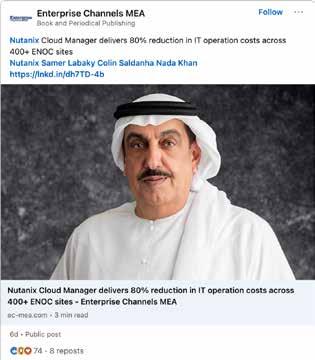


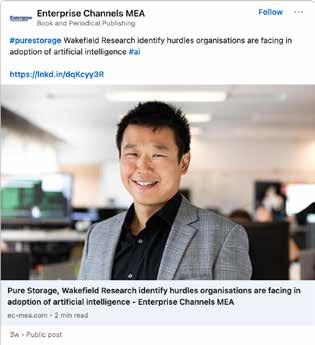
Freshworks announced appointment of Mika Yamamoto as the company’s Chief Customer and Marketing Officer. She will be responsible for leading the company’s global marketing and customer experience teams. Yamamoto comes to Freshworks from F5 where she most recently served as the Executive Vice President and the Chief Marketing and Customer Engagement Officer, and led the company’s data, marketing, digital transformation, and customer experience efforts across all products, segments, channels, and geographies.
Prior to joining F5, Ms. Yamamoto served as Global President of Marketo and then became SVP and General Manager of Marketo at Adobe after it was acquired. Ms. Yamamoto previously served as Chief Digital Marketing Officer and CMO of SMB for SAP. In addition, she has held senior leadership roles at Amazon Books, Microsoft Windows and Microsoft Stores, Gartner and Accenture.
 Mika Yamamoto Chief Customer and Marketing Officer at Freshworks
Mika Yamamoto Chief Customer and Marketing Officer at Freshworks
Veeam elevates Tim Pfaelzer to General Manager and Senior Vice President EMEA

Veeam Software, announced the promotion of Tim Pfaelzer as General Manager and Senior Vice President of Europe, Middle East, and Africa. He is responsible for Veeam’s business operations across all segments and markets across the region.
Pfaelzer has been with Veeam since July 2021 and most recently held the position of Vice President, Enterprise, EMEA. Tim has spent more than 20 years in the IT industry, including senior management roles at Dell and various positions at Adobe, Autodesk, and Salesforce. Based in Germany, Tim brings his vast experience in business development, marketing, sales leadership, and general management to the Veeam team and its customers and partners across the region.

Abdelhafid Mordi, CEO, Thales Emarat Technologies
Thales, a global leader in Defence & Security, Aerospace, and Digital Identity & Security has appointed Abdelhafid Mordi as CEO in the UAE and CEO of Thales Emarat Technologies. In this capacity, he also continues as Country Director of Thales in Iraq.
Building on more than four decades of established partnerships with government entities and the private sector, Mordi’s key focus will be on expanding the company’s deep technology footprint in the UAE, notably through the development of Thales Emarat Technologies. Thales will leverage this growing footprint to further its contributions in key sectors, as well as strengthen strategic partnerships, educational commitments and training programmes.
Abdelhafid Mordi’s professional career spans over two decades and several leadership positions in the industry. A graduate in International Business from Université Paris 1 Panthéon-Sorbonne, he began his career as field marketing manager with Schlumberger, joining Gemalto, now part of Thales, as sales manager in 2003, and then later appointed in 2006 Digital Identity and Security sales director for Middle East and North Africa.
Tim Pfaelzer, General Manager and Senior Vice President of Europe MEA, Veeam



SEC _ RITY IS NOT COMPLETE WITHOUT U!
18 APRIL - KSA |


23 APRIL - UAE APRIL - EU | APRIL - US

1 6 APRI L - QATAR | 17 APRIL - PAKISTAN











